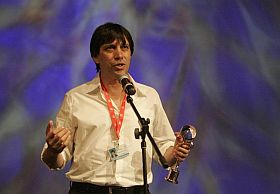


DOKLeipzig Sergey Dvortsevoy

He has only made 5 films, Sergey Dvortsevoy, but he is one of the most wanted documentarians for the so-called masterclasses. His popularity is huge as the attendance proved at the festival, where the room was packed for the 2 1/2 hour session, where Dvortsevoy entertained by talking, answering questions and showing clips from his work. I made an interview with the director 15 years ago for Danish television DR, that showed “Paradise”. What Dvortsevoy said on that occasion was exactly the same as here in Leipzig with the difference that he now speaks excellent English and knows how to structure his intervention. A charming showman as one said to me afterwards.
The first clip was – of course – the small boy eating and falling asleep in “Paradise”. Dvortsevoy told about his fights with the Kazakh cameramen, who did not understand that he wanted to have the boy filmed from one angle in long takes and not from different as they were used to. And he told about the problems that the family in the film still has with the authorities: How can you show the world that we are poor and dirty and wash our hair in kefir milk? (As a woman does in a beautiful scene in the film).” I was recently in India and the people told me that it was the same for Satayit Ray… they said to him, you sell poverty”.
Two clips from “Bread Day”: The long opening scene where the women push the wagon and (as the closing of the masterclass session) the goats kissing each other. The film was made on 35mm material (all his films were made on film material) that Dvortsevoy had won as awards for “Paradise”. The film ration was 1:2,5, and he instructed the cameraman NOT to shoot before he said so – “remember that every second costs 3-5$”!
You have to catch what you can not describe… “I love the image, I love life”, was one of many sentences from Dvortsevoy, who said that he is constantly analysing to find the energy in the scenes through the deep image, not the nice image. To the obvious question why he is not making documentaries any longer, he answered that it was so difficult to get funding for his documentaries and that it was also a moral question with reference to the people he has filmed in “Paradise”. More about this is to be found on this site. On the site of the festival you can find a podcast of the masterclass.